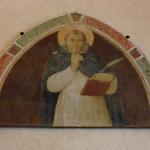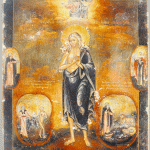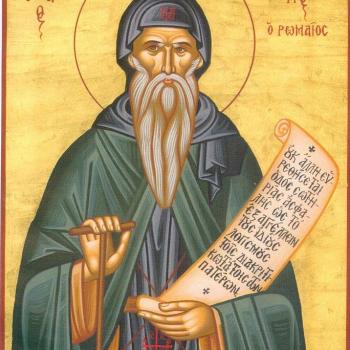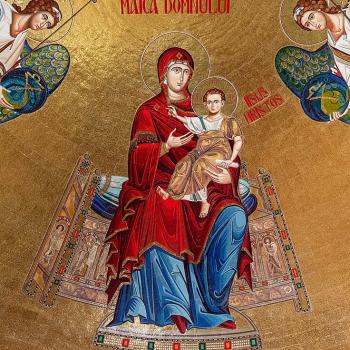
Celebrating The Saints
Throughout the Easter season, the Byzantine (Catholic and Orthodox) calendar gave us several Sundays which suggested the various ways Jesus engaged his ministry before his death and resurrection anticipated the greater work he would do after his resurrection from the death. We were also presented the way the risen Christ was first encountered, and how those who encountered him in his resurrected form saw he had the same body as before his resurrection, though now revealed to them in a glorified form. We were shown various ways Jesus healed people of physical maladies so that we can learn how he now is able to heal us of our own spiritual maladies (as well as encourage us to help those who are physically unwell, to be like him, and help people without cost, an ideal represented in tradition by the holy Unmercenaries). We were shown the way Jesus promised to give his followers the gift of the Holy Spirit, even was we were shown the Holy Spirit coming upon the church after Jesus’ ascension into heaven. Today we celebrate the outcome of all that Christ has done as we celebrate the saints, those who have joined themselves to Christ (in one way or another, some knowingly, some, such as those who came before the birth of Christ, unknowingly and mysteriously, as Jesus said would happen when talking about the last judgment), those who have opened themselves up to the Holy Spirit and the grace which the Holy Spirit gives so that they can be purified from all their sins and imperfections and attain perfection. The saints are holy because God is holy, and in the incarnation, God opened up the way they (and everyone else) can become a partaker of the divine nature, participating in God’s own holiness. Despite what they might have done wrong, despite all their sins and mistakes, the saints find themselves becoming perfect, even as the Father is perfect, because they have received the grace needed for such perfection. Even now, there are many in the world who thirst after and desire such holiness, and God will grant them the same chance as God gave those to the saints who came before them:
It is always God who is the origin and the center of all perfection. Even when the artist, the lover, the poet, the scientist, and the athlete cannot name him, God is the real reality behind their quest for perfection. Saints, scientists, actors, performers – all are stamped with a halo of glory and honor because God inhabits them with a special intensity.[1]
The saints are all different, each with their own personal qualities, their own personal ways in which they manifest the grace they receive; that means, we are shown many different ways in which we can become perfect with grace. God has many names, each representing a way in which God works in and with the world, and the saints find themselves taking on and joining themselves to those works, God’s divine energies, with some energies being more associated with some saints, and other energies more associated with others. This is how the saints can all imagine God in themselves and yet also not become exactly the same with each other.
The more a person seeks after perfection, the perfection which is proper to themselves, they will find themselves “sacrificing” much for that perfection. But, such a sacrifice is always worth it so long as it is justified, and the person pursue holiness in a proper fashion. It is possible to sacrifice something which should not be sacrificed, or worse, to become so attached to one form of holiness that a person becomes unbalanced and in that imbalance, sin in various ways. Moreover, all those pursuing such perfection (which should be all of us, in our own way), must make sure that they realize it cannot be done all by themselves; grace is always necessary, for grace is what allows them to transcend themselves and make such sacrifice end up promoting a greater good and not some nihilistic end. Thus, while many of Christ’s disciples and apostles left much to follow after Christ, to seek after their own perfection, they were told, they would attain much more than what they have given up:
Then Peter said in reply, “Lo, we have left everything and followed you. What then shall we have?” Jesus said to them, “Truly, I say to you, in the new world, when the Son of man shall sit on his glorious throne, you who have followed me will also sit on twelve thrones, judging the twelve tribes of Israel. And every one who has left houses or brothers or sisters or father or mother or children or lands, for my name’s sake, will receive a hundredfold, and inherit eternal life. But many that are first will be last, and the last first (Matt. 19:27-30 RSV)
With holiness, the first is last, and the last is first; those who seek true greatness will become the servant of all, sharing with everyone the gifts they have been given. Those who would seek to appear great, those who seek praise, might get it, but they will find their vainglory and pride will get in the way of true holiness, and so they will find themselves in “lesser” positions in the kingdom of God (if they attain it). Many great saints, therefore, cut themselves from the world, not to deny it and the people in it, but rather, so they can grow and become capable for doing what they are called to do to make the world better; they sought to become mediators to the world, helping to make it a better place instead of only looking after themselves. Their greatness does not lie in their ascetic discipline, but in how they used that discipline to join themselves with God’s work in and with the world, doing what they can, like God, to improve the conditions of everyone else. Of course, this spirit remains once someone dies; that is the saints who have been glorified in heaven continue to desire to work for the good of all, to be mediators like they were during their temporal existence, and so they will continue to work on behalf of all, listening to the needs of the people and doing what they can to have such needs met.
The Feast of All Saints, which on the Byzantine Calendar is the Sunday after Pentecost, therefore reminds us not only of the glorious achievements and perfection of those who came before us, but it also shows us the way God’s grace continues to be shared to the world. We are encouraged to join in with God’s work, God’s energies, and become saints as well. We celebrate the saints who came before us and remember them, looking to them as examples of what we could become, not because we are to do the exact same things they have done (they would be the first to tell us otherwise, because they will say they have sinned in ways we should not repeat), but because they show us that those who seek perfection and holiness can attain it thanks to the love God has shown the world.
[1] Archbishop Joseph Raya, The Abundance of Love: The Incarnation and Byzantine Tradition (Combermere, ON: Madonna House Publications, 1989; 3rd ed.: 2016), 115.
Stay in touch! Like A Little Bit of Nothing on Facebook.
If you liked what you read, please consider sharing it with your friends and family!
N.B.: While I read comments to moderate them, I rarely respond to them. If I don’t respond to your comment directly, don’t assume I am unthankful for it. I appreciate it. But I want readers to feel free to ask questions, and hopefully, dialogue with each other. I have shared what I wanted to say, though some responses will get a brief reply by me, or, if I find it interesting and something I can engage fully, as the foundation for another post. I have had many posts inspired or improved upon thanks to my readers.













